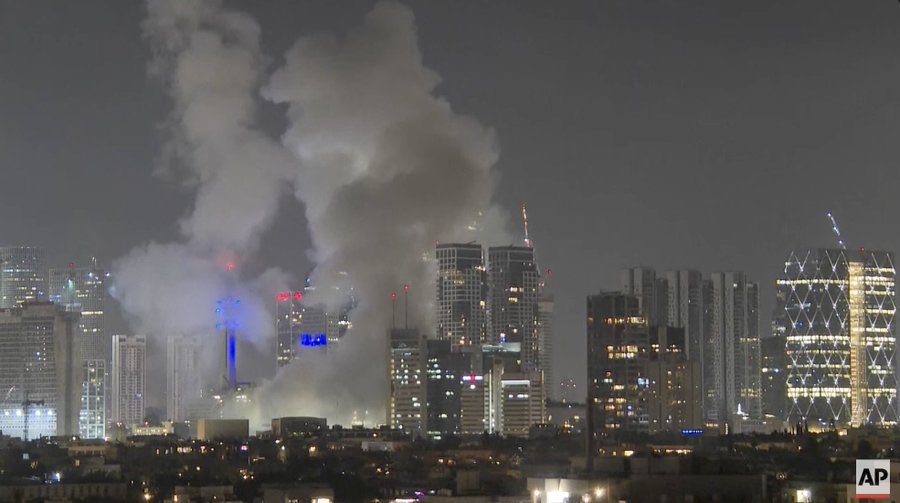BY PC Bureau
June 14, 2025 — A dangerous new chapter has opened in Middle East hostilities as direct military confrontation between Iran and Israel intensified this week, triggering widespread global concern. On Saturday, the Iranian government confirmed that at least 78 of its citizens, including top military commanders and nuclear scientists, were killed in a series of targeted Israeli airstrikes and missile attacks—some of the most consequential in the decades-old animosity between the two nations.
Israel-Iran Military Clash Deepens
The escalation began earlier this week with Iran launching drones and missiles toward Israeli territory in retaliation for the April assassination of senior IRGC commanders, allegedly by Israeli operatives. Israel responded with force, unleashing a wave of airstrikes on Iranian military installations and nuclear-linked sites.
On Saturday, Israel’s Defence Minister, Israel Katz, issued a stark warning: “Tehran will burn if Iran continues to test our patience.” Iran’s Supreme Leader Ayatollah Ali Khamenei responded with defiance, vowing to punish Israel and threatening that any country aiding Tel Aviv—directly or indirectly—would face strikes on regional military bases and naval assets.
READ: Meth, Heroin, and Cartels: NE India Battles Drug Surge
High-Profile Iranian Deaths Confirmed
Iran’s ambassador to the United Nations confirmed 78 fatalities, stating that Israel’s attacks deliberately targeted high-ranking figures. Iranian state media later confirmed the deaths of:
*General Hossein Salami, Commander-in-Chief of the Islamic Revolutionary Guard Corps (IRGC)
*Major General Mohammad Bagheri, Chief of Staff of Iran’s Armed Forces
*Two IRGC Deputy Commanders
*Nine senior nuclear scientists involved in Iran’s advanced uranium enrichment program
*These losses are seen as a devastating blow to Iran’s military and nuclear infrastructure. In the western province of Hamdan, two civilians were killed and five others injured by missile strikes. Additionally, Israeli airstrikes on Friday alone claimed 60 lives, including 20 children. Iran reported over 320 wounded—“the overwhelming majority of them civilians,” according to state sources.
Israeli Defense Minister Israel Katz warns Iran’s leader Ali Khamenei that if missiles continue to be fired at Israel, “Tehran will burn.”
“The Iranian dictator is turning the citizens of Iran into hostages and creating a reality in which they, especially the residents of… pic.twitter.com/2Ft233kHMD
— Vanguard Intel Group 🛡 (@vanguardintel) June 14, 2025
Regional Fallout and Global Reactions
The conflict is causing deep unease across the Middle East, with fears that further escalation could spark a broader regional war. Iran has hinted that its retaliation will not be limited to Israel alone. In an address on Saturday, Ayatollah Khamenei warned, “Any nation that provides logistical, military, or intelligence support to Israel will be considered an accomplice—and they will pay.”
This statement is widely interpreted as a direct threat to U.S. and U.K. military installations in the Gulf, Iraq, and the Mediterranean.
READ: Major Arms Cache, Including 328 Guns, Seized in Imphal Valley Districts
India Distances Itself from SCO Statement
As international actors weigh in, India on Saturday made it clear that it would not align itself with the Shanghai Cooperation Organization’s (SCO) condemnation of Israel. The Ministry of External Affairs (MEA) issued a carefully worded clarification, stating: “India did not participate in the discussions on the above-mentioned SCO statement. Our position remains consistent with the statement issued on June 13.”
That earlier statement called for restraint and urged “all sides to engage in dialogue and diplomacy to de-escalate the situation.”
India’s response underscores its nuanced balancing act in the region—maintaining strategic relations with Israel while also engaging Iran diplomatically and economically.
Outlook: A Perilous Road Ahead
With the death toll rising and regional tensions simmering, the international community is urging immediate de-escalation. The United Nations Security Council is expected to convene an emergency session early next week.
While backchannel diplomatic efforts are reportedly underway through Oman, Turkey, and France, the situation remains volatile. Military analysts warn that further retaliatory moves could push the region into an uncontrollable spiral, potentially involving Hezbollah in Lebanon or Iran-backed militias in Iraq and Syria.
For now, the world watches anxiously as two bitter enemies continue their deadly confrontation—with far-reaching implications for regional stability and global security.














